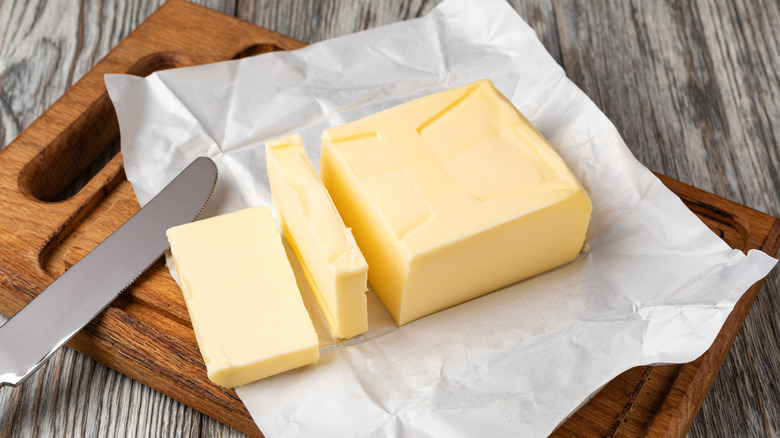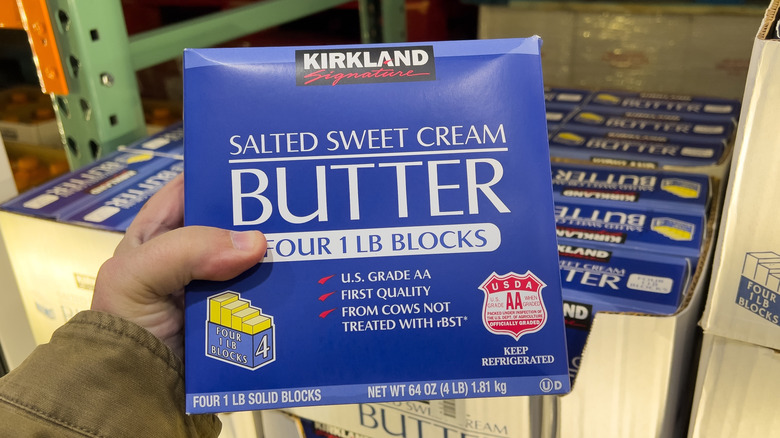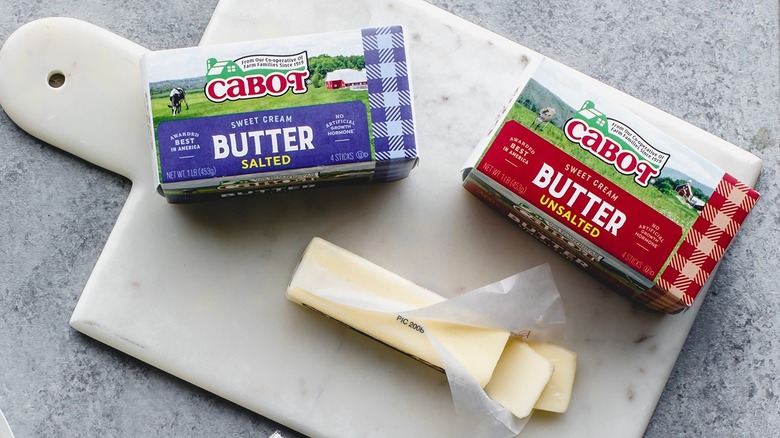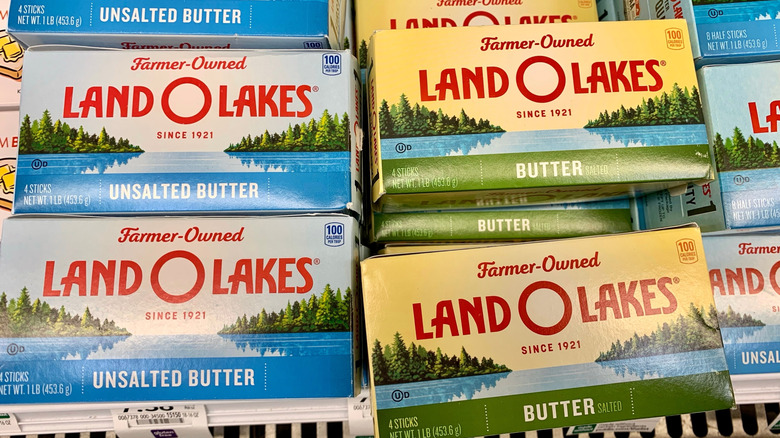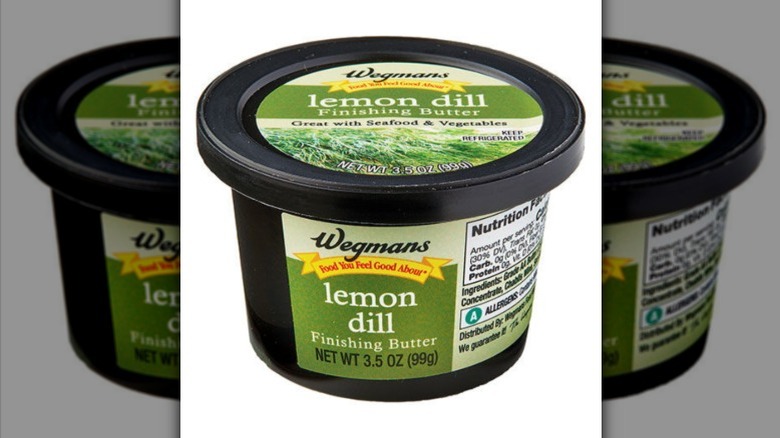The Biggest Butter Recalls To Hit US Shelves
Few things are better than butter, but this maxim no longer holds true when that butter gets recalled. Before you clear out that little compartment in your refrigerator, though, keep in mind that many other foods are more likely to be affected by safety recalls, like leafy greens (which are seldom exposed to the high heat that can kill off harmful bacteria) and beef (which may be exposed to E. coli from the cow's intestines). Soft cheeses are also on that list, as they're high in moisture and don't undergo the same aging process as hard cheeses, leaving them susceptible to bacterial growth. While butter may not be one of the most frequently recalled foods, contamination from bacteria and other substances is still a possibility, and these instances are proof.
From potentially dangerous organisms to tiny metal fragments, recalled butter may contain any number of unpleasant aberrations. While some of these incidents only affected a few hundred pounds of the dairy product, other recalls impacted thousands of pounds of inventory — and, by extension, put thousands of American consumers at potential risk.
Costco recalled nearly 80,000 pounds of butter in 2024
In October 2024, Costco recalled 79,200 pounds of sweet cream butter, all of which was sold under its in-house label, Kirkland Signature. However, contrary to what you might expect, this incident wasn't caused by bacterial contamination. Instead, it was all the result of a labeling error.
As mandated by the FDA, manufacturers must declare major allergens on food packaging, and one of these eight major allergens is milk (others include eggs, fish, and tree nuts). While it may seem like common knowledge that butter contains milk, an undeclared allergen is still sufficient cause for a recall, as shoppers may note the absence of an allergen label on the butter's packaging and consider it safe, even if they usually avoid consuming milk. Since Kirkland's packaging for its Sweet Cream Butter failed to name this allergen and only listed cream — not milk — among its ingredients, the product was removed from shelves, and those who had already purchased the product were encouraged to return the item to their local Costco.
The error, brought to the warehouse chain's attention by a Texas wholesaler, appeared in Costco locations throughout the state and affected both salted and unsalted versions of the product. It's unclear whether or not this mislabeling affected any consumers directly, but as the latest expiration date for the recalled units passed on March 29, 2025, the risk has likely been mitigated.
Cabot Creamery recalled more than 1,700 pounds of butter in 2025 due to potential waste contamination
Cabot Creamery landed a respectable seventh-place spot in our worst-to-best ranking of 16 popular butter brands, but that doesn't mean its products are always above reproach. On March 26, 2025, the brand's parent company, Agri-Mark, issued a voluntary recall of 189 cases (or 1,701 pounds) of its salted Extra Creamy Premium Butter. The product — sold in 8-ounce boxes, each containing two 4-ounce sticks — was "contaminated with elevated levels of coliform," according to an FDA release. Coliform is a bacteria found in human and animal waste, and it's also a common water system contaminant in Vermont, where some of the brand's products are manufactured.
Fortunately, the associated risk for this particular recall seems to be relatively low. The FDA designated the incident as Class III, meaning the product is unlikely to cause any adverse health effects. In more extreme cases, the presence of coliform can indicate fecal contamination, which may result in illnesses such as E. coli.
While the affected products reached seven states in total — Vermont, New York, Pennsylvania, Maine, Connecticut, New Hampshire, and Arkansas — Cabot Creamery shared in a statement that Agri-Mark "successfully recovered 99.5% of the lot of the recalled product before it was sold to consumers." The statement also clarified that Agri-Mark had identified and attended to the cause of the contamination, though the exact source of the contaminant is unclear. Only 17 packages of the tainted butter were sold, but anyone in possession of the product should either throw it out or return it to the store. The butter's "best by" date is September 9, 2025, and its UPC is 0 78354 62038 0.
Land O'Lakes recalled over 126,000 pounds of butter for possible metal fragments in 2003
This Land O'Lakes recall is a bit different from the others gathered here. For one thing, it took place over 20 years ago, and as such, information regarding the incident is scant. What we do know, however, and what really sets it apart from similar occurrences, is that this butter was recalled due to the potential presence of small pieces of metal.
Land O'Lakes voluntarily recalled 126,540 pounds of its Salted Stick Butter in July 2003 after determining that the product, which was sold in 1-pound packages, may have contained small metal fragments. How exactly the fragments first came into contact with the butter is unclear. The affected products were made in Kent, Ohio, and distributed across 22 states, including Illinois, Kansas, Michigan, Texas, and the Carolinas, among others.
Land O'Lakes shared the production codes for the affected units — KE107P, KE108P, and KE109P — and advised those who had already purchased the butter to return the product for a refund. Based on available reports, it doesn't appear as though any consumers were negatively impacted by the recall.
Wegmans recalled its Lemon Dill Finishing Butter in 2022 due to possible Listeria contamination
Back in 2022, we reported on a Wegmans butter recall that put consumers at risk. The store's 3.5-ounce black tubs of Lemon Dill Finishing Butter, produced by Epicurean Butter LLC, were flagged in August of that year for potential contamination by Listeria monocytogenes. Listeria is a type of bacteria that, according to the CDC, is the "third leading cause of death from foodborne illness" in the U.S. Approximately 1,600 people become infected each year, and about 260 of those cases are fatal.
The butter in question appeared in Wegmans stores across multiple states, namely New York, Pennsylvania, New Jersey, Maryland, Massachusetts, Virginia, North Carolina, and Washington D.C. The cause of contamination was the dill, which came frozen from Epicurean Butter's supplier, SupHerb Farms. This supplier was the party that alerted Epicurean Butter to the potential bacteria risk following a test of the product. The recall affected 1,000 tubs of butter across 12 lots, with expiration dates spanning from July 5 to November 17, 2022. No information has been revealed regarding potential infections among consumers.
